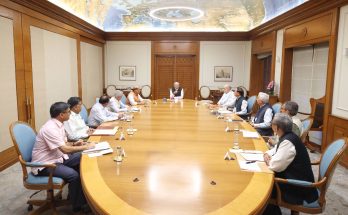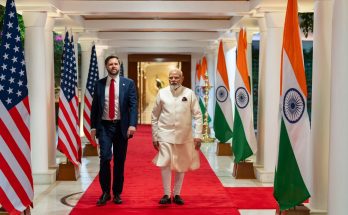
By Shweta Aggarwal
Prime Minister Narendra Modi has announced that India will observe a day of national mourning on July 9 as a mark of respect to former Japanese PM Shinzo Abe, who was killed while on the campaign trail in the Japanese city of Nara.
“I am shocked and saddened beyond words at the tragic demise of one of my dearest friends, Shinzo Abe,” said Mr Modi in a tweet on July 8 shortly after Abe was killed shot at about 11:30 a.m. while delivering a street speech in the western city of Nara ahead of July 9 upper house election.
In a homage on twitter, Mr Modi glowingly described the 67-year-old Abe as “a towering global statesman, an outstanding leader, and a remarkable administrator.”
“He dedicated his life to make Japan and the world a better place,” he said.
“In geopolitical and foreign policy terms, Shinzo Abe has left a lasting legacy. Concepts like Indo-Pacific were given a new life and resonance in international discourse by Abe,” said Manish Chand, foreign policy commentator and Editor-in-Chief, India and The World, a magazine-journal focused on international affairs. “It’s a sad day for a rules-based world order as Abe was an ardent advocate and progenitor of Free and Open Indo-Pacific. It’s a sad day for India-Japan relations as it was Abe who provided a new quality and strategic dimension to India-Japan partnership,” said Mr Chand.
“PM Modi and Abe had developed a special personal rapport. The Modi-Abe chemistry propelled India-Japan relations to new heights,” said Chand. “Under Abe’s watch as Japan’s much-loved and admired leader, Japan became India’s closest strategic partner in Asia and a preeminent partner in India’s development journey,” said Mr Chand.
“He was a prime mover behind the Quad grouping of democracies which includes the US, India, Japan and Australia, and nurtured Quad as a pressure group against Chinese assertiveness,” said Mr Chand.
“PM Shinzo Abe always had focus on Japan’s defence and security. He often spoke about Asian ‘Security Diamond’ initiative, which later evolved into Indo-Pacific. In 2015, we roped in Japan as a participant in Malabar exercises. It had shared vision of PM Abe and PM Modi,” said Sujan Chinoy, a former Indian ambassador to Japan and Director-General, Manohar Parrikar Institute for Defence Studies and Analysis (MPIDSA).
Author Profile
- India Writes Network (www.indiawrites.org) is an emerging think tank and a media-publishing company focused on international affairs & the India Story. Centre for Global India Insights is the research arm of India Writes Network. To subscribe to India and the World, write to editor@indiawrites.org. A venture of TGII Media Private Limited, a leading media, publishing and consultancy company, IWN has carved a niche for balanced and exhaustive reporting and analysis of international affairs. Eminent personalities, politicians, diplomats, authors, strategy gurus and news-makers have contributed to India Writes Network, as also “India and the World,” a magazine focused on global affairs.
Latest entries
 India and the WorldApril 23, 2025Kashmir terror: India hits back at Pakistan, highlights cross-border linkages
India and the WorldApril 23, 2025Kashmir terror: India hits back at Pakistan, highlights cross-border linkages India and the WorldApril 23, 2025The Century of America and India: Growing Together
India and the WorldApril 23, 2025The Century of America and India: Growing Together In ConversationApril 20, 2025India Can Contribute Largely to Development of Morocco’s Defence Industry: Ambassador
In ConversationApril 20, 2025India Can Contribute Largely to Development of Morocco’s Defence Industry: Ambassador India and the WorldApril 2, 2025Mapping Next Steps for BIMSTEC
India and the WorldApril 2, 2025Mapping Next Steps for BIMSTEC







